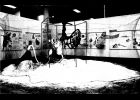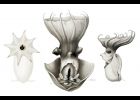Fernando Quesada López
Fernando Quesada López is an architect, PhD in architecture (2002), and professor of architecture at Universidad de Alcalá, Spain. He was a Fulbright scholar at Columbia University, New York, between 1998 and 2000, and visiting scholar at Delft University of Technology in 2009-2010, Museo Universitario de Arte Contemporáneo UNAM México City in 2013, and Penn School of Design at University of Pennsylvania in 2019. Since 2002 his work has focused on two broad fields: the theory and history of modern and contemporary architecture, and its relationship with the living arts. The main axes in this critical framework are the body, biopolitics, and social spatiality and theatricality. His publications include: La Caja mágica. Cuerpo y escena (The Magic Box. Body and Scene, 2005); Del cuerpo a la red (Body to Network, 2013); Arquitecturas del devenir (Architectures of Becoming, 2014); and Mobile Theatre. Architectural Counterculture on Stage, 2021. His forthcoming book is Functionalism and Architecture. The Function of Function, 2024.
Articles of Fernando Quesada López
Tertium non datur. El tercero excluido
This paper retraces the relationship between Louis Bec’s work for the Bienal de São Paulo Sulfanogrades (1981) and his book with Vilém Flusser, Vampyroteuthis Infernalis (1987). Looking back at the first three exhibitions of the Sulfanogrades in France in 1976, and the subsequent text produced by Flusser for this matter, Orthonature. Paranature, it seems clear that a large part of the vocabulary and many of the ideas contained in Vampyroteuthis Infernalis had already been formulated by 1976, due to the close and regular exchange between Bec and Flusser. In Bec’s and Flusser’s oeuvre the distinction between art and science, nature and culture, animal and human, or truth and fable, is defied and exposed as the wrong way out of the old dilemma of the excluded third, or tertium non datur. Both spheres overlap, rather than being mutually exclusive, and the space of overlapping is no other than that of epistemology. If the Sulfanogrades remove agency from both the human subject and the animal object, ultimately giving all subjective agency to biology, Vampyroteuthis Infernalis exposes a true theory of the human as an inverse vampire, a new model for contemporary artists.

